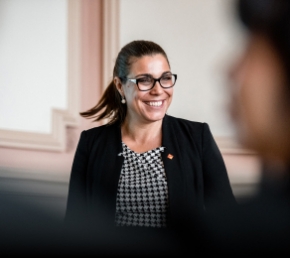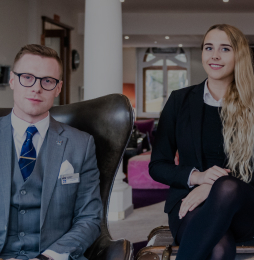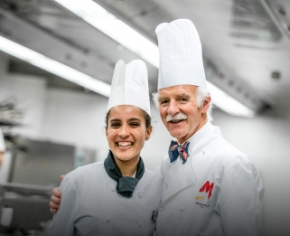- About
- Schools
- Lifelong Education
- News & Events
- Community
#Faculty
Mind Matters: Coping with Self-doubt
Cristina Cantu, Psychologist at César Ritz Colleges, shares tips on combatting self-doubt and self-comparison; two habits that can sabotage happiness and success.
The professors and staff at César Ritz Colleges Switzerland are highly attuned to the emotional and psychological challenges their students confront while pursuing higher education at an international level and preparing to enter the highly competitive business world of international hospitality. César Ritz Colleges employs highly skilled and experienced psychologists, counselors, and job coaches to give each student the highest level of support possible and to help them achieve their goals and dreams. On a recent busy day at César Ritz Colleges, we sat down with Cristina Cantu, César Ritz Colleges Psychologist working at the Brig campus, and asked her some questions that are likely on the minds of more than a few aspiring students.
Please tell us how students can learn to embrace their unique journeys without comparing themselves to others, especially in a world that often emphasizes success as a linear path?
I believe that comparing ourselves to others is part of human nature and, within reason, nothing is wrong with it. But a problem can arise if our comparing ourselves to others becomes a constant, overpowering struggle in our lives, one that feeds self-doubt and undermines our mental health and self-esteem.
I consider comparison as an act of violence against the self. When we compare ourselves to others, we are often comparing our weaknesses against their strengths. How can we be so unfair to ourselves?
A question we could all ask ourselves is: “Will comparing make me feel better or worse about myself?” If comparing yourself to someone else motivates you, then it’s ok, but if it makes you feel miserable, why do something that gives you such pain? Don’t let comparison rob you of your joy of learning and growing. Your time in university is one of the most special times of your life, use comparison to set examples of what you can achieve! Remember that you already made it into a competitive university and are studying in one of the best schools in the world. Let’s always keep that truth in our sights!
Embrace yourself. Accept and love the person you are. When you are centered and kind to yourself, finding and following your unique path becomes a natural consequence.
What advice do you have for students who are struggling with self-doubt or feelings of inadequacy because they haven't found their desired job or internship or haven't been accepted where they had hoped to be?
Again, we must start from the self. Feeling inadequate or doubting oneself comes from our own insecurity and negative self-talk. Change the script by saying to yourself any number of positive, life-affirming thoughts such as:
- “I am enough”
- “I am doing my best”
- “setbacks are something to set aside as I move on with a new strategy to accomplish my goals”
- “I am frustrated, but I will not give up”
- “I want to use the negative experiences in my life to learn, grow, and evolve”
Did you know that Albert Einstein failed his bachelor's degree examination the first time around? And that Walt Disney, the famous animator and film producer, was fired from one of his first animation jobs because they said he “lacked imagination and had no good ideas”? These two men persevered and, as we know, Einstein won a Nobel prize for his astounding scientific discoveries in physics, and Walt Disney’s creative empire became one of the world's largest family entertainment media corporations.
How can students cultivate resilience to bounce back from setbacks and maintain a positive mindset despite facing challenges in their academic or professional pursuits?
In my opinion, how students choose to view setbacks is the central question. If they define them as permanent and paralyzing events, they will possibly feel lost, helpless, and powerless to act. This choice, over time, can lead to depression and poor mental health. But, if we can improve our mental well-being, we improve our chances of success.
If students learn to view setbacks as an inevitable part of life and welcome the challenges and opportunities that adversities bring, then they are more likely to overcome them and move forward toward their goals.
When faced with an inevitable setback, here is my advice:
- learn to relax and meditate, and adopt the behaviors that will enable you to sleep well
- don’t let negative thoughts disrupt your efforts
- maintain perspective, reminding yourself that the setback is only a moment in your life – over the long term, a single setback will not have much of an impact
- be flexible – plans might need to be modified, as things can change
- chose your response: will crying and panicking bring you anything good? Instead, choose to remain calm, do some thinking, and come up with new solutions
- develop good friendships and connections so that you will have personal support – rather than isolate yourself, ask for help and feedback and what you can do to improve the next situation.
What are some effective coping mechanisms or strategies you recommend for students feeling overwhelmed by the pressure to excel academically or to find the "perfect" internship or job?
Many students are facing adult pressures for the first time. Academic pressure and the uncertainty one feels when looking for employment can have a devastating effect on a student’s mental health, leading to consequences such as depression, substance abuse, panic attacks, poor sleep, high levels of stress, and burnout. Learning to cope with these intangible stressors early in life will help them as they evolve into working professionals.
A problem shared is a problem halved.
I always recommend to first talk about it; share your problems with others. Talk to your teachers, counselor, and trusted friends and let them know about your struggles. As is often the case, you will find that you are not alone in the pressure cooker. Your peers will possibly thank you for being a door opener.
Second, consider the following stress management behaviors:
- exercise daily because exercise boosts endorphins, which make you happier and less anxious
- set aside days to recharge by going to a concert or fun event, spending time with your friends, visiting a new place – don’t feel guilty, rather enjoy your time off – you deserve it!
- plan out your time and schedule – you will feel more in control.
- protect your brain and body by eating healthy food
- sleep eight hours per night, away from any screen or other form of technology
Do you have any final advice on managing student stress?
Teachers can help students by creating a task-oriented, non-competitive learning environment. Students’ shared objectives are to learn and pass their exams. By collaborating rather than competing, they stand a better chance to acquire knowledge, creatively solve problems, gain new perspectives, and enjoy each other’s company and, therefore, succeed.
Also, to lessen exam-related fears, teachers could conduct regular mock examinations that can be discussed in small groups to brainstorm and find solutions together, giving students opportunity to actively prepare for the real exam beyond simply studying.
A little note about “perfectionism” – it’s an ugly beast. In counseling students, I have often encountered the hideous face of perfectionism, when a student expresses that “nothing I do is worthwhile unless it’s perfect”. These students view a B+ as a failure. They will often take 30 minutes to write and re-write one email with their main priority being the result rather than the process of learning. None of these behaviors are productive.
An excellent motto to live by, that will save you a great deal of time and anxiety is, “better done than perfect”.
This article is republished from César Ritz Colleges Switzerland.
Are you interested in studying at a school that has your success and wellbeing at heart? Learn more about César Ritz Colleges Switzerland.
#Faculty


















